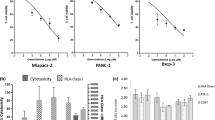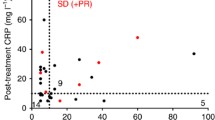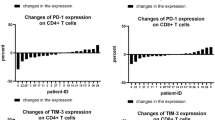Abstract
Effects of gemcitabine (Gemzar) on immune cells were examined in pancreas cancer patients to determine whether it was immunosuppressive, or potentially could be combined with vaccines or other immunotherapy to enhance patient’s responses to their tumors. Blood was obtained at five time-points, before therapy, 3–4 days after initial gemcitabine infusion and immediately preceding three additional weekly infusions. Effects on T-cell subsets, B-cells, myeloid dendritic cell precursors, antigen presenting cells (APC), activated/memory, and naive cells were examined. Functional activity was measured by intracellular staining for cytokines before and after T-cell activation, and by interferon γ production in EliSpot responses to tumor presentation. Although absolute lymphocyte counts decreased with the initial treatment with gemcitabine infusion, the counts stabilized during subsequent treatments, then returned within normal ranges seven days after the fourth treatment so that the absolute lymphocyte count no longer differed significantly from that prior to treatment. These effects on absolute lymphocyte counts were mirrored by statistically significant decreases in absolute numbers of CD3 and CD20 lymphocytes during these time periods. The proportions of T and B-cells, however did not change significantly with therapy, although significance changes were observed in some specialized subsets. A decrease in the proportions of the major BDCA-1+, CD1b myeloid dendritic cell subset and a reciprocal increase in the minor BDCA-3+ dendritic cell subsets resulted at 3–4 days, then their levels returned to normal. No significant changes in percentages of CD86 and CD80 APCs or CD4+, CD25+T-cells were documented. Increased percentages of CD3+, CD45RO+ memory lymphocytes reached significance at day 7, then declined to statistically significant decrease at days 14 and 21 after the second and third infusions, respectively. Immune T-cells were functional in pancreas cancer patients treated with gemcitabine. The data suggest that gemcitabine therapy may decrease memory T-cells and promote naive T-cell activation. We conclude that gemcitabine therapy (1) is not immunosuppressive and (2) may enhance responses to specific vaccines or immunotherapy administered to activate or support immune responses directed toward driving effector immunity to cancer cells.







Similar content being viewed by others
Abbreviations
- APC:
-
Antigen presenting cells
- FITC:
-
Fluorescein isothiocyanate
- PE:
-
Phycoerthrin
- wbc:
-
White blood cells
References
Plate JM, Harris JE (2000) Immune cell functions in pancreatic cancer. Crit Rev Immunol 20:375
Plate JM, Shott S, Harris JE (1999) Immunoregulation in pancreatic cancer patients. Cancer Immunol Immunother 48:270
Alvino E, Fuggetta MP, Tricarico M, Bonmassar E (1998) 2′-2′-difluorodeoxycytidine: in vitro effects on cell-mediated immune response. Anticancer Res 18:3597
Daikeler T, Maas K, Hartmann JT, Kanz L, Bokemeyer C (1997) Weekly short infusions of gemcitabine are not associated with suppression of lymphatic activity in patients with solid tumors. Anticancer Drugs 8:643
Nowak AK, Lake RA, Marzo AL, Scott B, Heath WR, Collins EJ, Frelinger JA, Robinson BW (2003) Induction of tumor cell apoptosis in vivo increases tumor antigen cross-presentation, cross-priming rather than cross-tolerizing host tumor-specific CD8 T cells. J Immunol 170:4905
Nowak AK, Robinson BW, Lake RA (2003) Synergy between chemotherapy and immunotherapy in the treatment of established murine solid tumors. Cancer Res 63:4490
Heiser A, Dahm P, Yancey DR, Maurice MA, Boczkowski D, Nair SK, Gilboa E, Vieweg J (2000) Human dendritic cells transfected with RNA encoding prostate-specific antigen stimulate prostate-specific CTL responses in vitro. J Immunol 164:5508
Heiser A, Maurice MA, Yancey DR, Coleman DM, Dahm P, Vieweg J (2001) Human dendritic cells transfected with renal tumor RNA stimulate polyclonal T-cell responses against antigens expressed by primary and metastatic tumors. Cancer Res 61:3388
Plate JM, Petersen KS, Buckingham L, Shahidi H, Schofield CM (2000) Gene expression in chronic lymphocytic leukemia B cells and changes during induction of apoptosis. Exp Hematol 28:1214
Heeger PS, Greenspan NS, Kuhlenschmidt S, Dejelo C, Hricik DE, Schulak JA, Tary-Lehmann M (1999) Pretransplant frequency of donor-specific, IFN-gamma-producing lymphocytes is a manifestation of immunologic memory and correlates with the risk of posttransplant rejection episodes. J Immunol 163:2267
McCoy JP Jr, Overton WR (1994) Quality control in flow cytometry for diagnostic pathology: II. A conspectus of reference ranges for lymphocyte immunophenotyping. Cytometry 18:129
Baecher-Allan C, Brown JA, Freeman GJ, Hafler DA (2001) CD4+CD25high regulatory cells in human peripheral blood. J Immunol 167:1245
Dieckmann D, Plottner H, Berchtold S, Berger T, Schuler G (2001) Ex vivo isolation and characterization of CD4(+)CD25(+) T cells with regulatory properties from human blood. J Exp Med 193:1303
Jonuleit H, Schmitt E (2003) The regulatory T cell family: distinct subsets and their interrelations. J Immunol 171:6323
Jonuleit H, Schmitt E, Stassen M, Tuettenberg A, Knop J, Enk AH (2001) Identification and functional characterization of human CD4(+)CD25(+) T cells with regulatory properties isolated from peripheral blood. J Exp Med 193:1285
Bartido SM, Zier K (2003) T-cell responses to multiple antigens presented by RNA-transfected APCs: a possible immunomonitoring tool. Cancer Immunol Immunother 53:100
Minami T, Nakanishi Y, Izumi M, Harada T, Hara N (2003) Enhancement of antigen-presenting capacity and antitumor immunity of dendritic cells pulsed with autologous tumor-derived RNA in mice. J Immunother 26:420
Morse MA, Nair SK, Mosca PJ, Hobeika AC, Clay TM, Deng Y, Boczkowski D, Proia A, Neidzwiecki D, Clavien PA, Hurwitz HI, Schlom J, Gilboa E, Lyerly HK (2003) Immunotherapy with autologous, human dendritic cells transfected with carcinoembryonic antigen mRNA. Cancer Invest 21:341
Nair S, Boczkowski D (2002) RNA-transfected dendritic cells. Expert Rev Vaccines 1:507
Amlot PL, Tahami F, Chinn D, Rawlings E (1996) Activation antigen expression on human T cells. I. Analysis by two-colour flow cytometry of umbilical cord blood, adult blood and lymphoid tissue. Clin Exp Immunol 105:176
Biselli R, Matricardi PM, D’Amelio R, Fattorossi A (1992) Multiparametric flow cytometric analysis of the kinetics of surface molecule expression after polyclonal activation of human peripheral blood T lymphocytes. Scand J Immunol 35:439
Ziegler SF, Ramsdell F, Alderson MR (1994) The activation antigen CD69. Stem Cells 12:456
Nowak AK, Robinson BW, Lake RA (2002) Gemcitabine exerts a selective effect on the humoral immune response: implications for combination chemo-immunotherapy. Cancer Res 62:2353
Plate JMD, Harris JE (2004) Effects of gemcitabine treatment on immune cells and functions in pancreatic cancer patients. Proc Am Assoc Cancer Res 45:500
Acknowledgement
This work was supported in part by the Eli Lilly Research Laboratories, and the Wadsworth Foundation.
Author information
Authors and Affiliations
Corresponding author
Rights and permissions
About this article
Cite this article
Plate, J.M.D., Plate, A.E., Shott, S. et al. Effect of gemcitabine on immune cells in subjects with adenocarcinoma of the pancreas. Cancer Immunol Immunother 54, 915–925 (2005). https://doi.org/10.1007/s00262-004-0638-1
Received:
Accepted:
Published:
Issue Date:
DOI: https://doi.org/10.1007/s00262-004-0638-1




